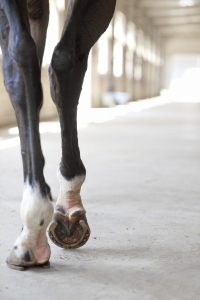As the weather takes a turn for the worst and day light hours fade, the majority of horses have to spend much more time in their stable. For some horses, this is a welcome respite from the wet and chilly nights, but for some it can lead to problems.
One such common issue is ‘fat legs’ - where a horse will get filled legs after being stabled, and the legs return to normal once turned out/exercised. The instance of ‘sausage legs’ occurs due to fluid accumulation.
Why does this happen?
When a horse is moving around, such as during turnout or when exercised, fluid is moved around the body when the hoof hits the ground - which acts a bit like a pump, pushing blood and lymphatic fluid up the legs and into the body. When the horse is unable or unwilling to move around, for example, when stabled overnight, this fluid does not get ‘pumped’ back into the body, and legs can become filled. This is most common in older horses and generally happens to finer types, like Thoroughbreds, predominantly in the hind legs, though all legs can be affected.
How can I help reduce the likelihood of my horse getting filled legs?
- Try to keep standing in to a minimum - turn out as much as possible, using a school or
 concrete pad if fields are not available
concrete pad if fields are not available
- If your horse must be stabled for long periods, keep them moving as much as possible! If they can’t be ridden, walking in hand or using a horse walker will promote fluid dispersion
- Correct stable bandaging can also help reduce leg filling - but make sure you take them off regularly to stop them rubbing
- Feed herbs that can help to maintain a healthy lymphatic and circulatory system -
such as those in Feedmark’s No Fill
What is No Fill?
No Fill is the perfect blend of herbs to support the lymphatic and circulatory systems, providing nutritional support to help maintain correct fluid distribution in lower limbs. It is ideal for

horses with fat legs after a night stabled, those on box rest, or those having to stand in for prolonged periods of time. No Fill Includes the herbs Dandelion, Hawthorn, Nettle, Clivers, Marigold and Ginkgo, all traditionally used for their lymphatic, anti-oxidising and circulatory properties.
Can you tell me a bit more about these plants?
Marigold flowers work synergistically with Clivers to promote a healthy lymphatic system. Together, these ingredients can help to maintain normal fluid retention in the leg. Dandelion further helps the lymphatic system by keeping the liver and kidneys healthy and promoting excretion of excess fluid. Hawthorn is a plant traditionally used to support the heart and
circulatory system. It contains Rutin, a powerful compound which helps to maintain flexible and strong capillaries and, along with Nettle, contributes greatly to cardiovascular health. Lastly, Ginkgo is an antioxidant herb, supporting circulation by helping blood to remain at the correct consistency and maintaining small blood vessels and capillaries so they keep clear and open, promoting healthy circulation. These herbs combine to offer superior Lymphatic and Circulatory support, to help keep legs looking slim even during periods of excessive stabling.
 concrete pad if fields are not available
concrete pad if fields are not available horses with fat legs after a night stabled, those on box rest, or those having to stand in for prolonged periods of time. No Fill Includes the herbs Dandelion, Hawthorn, Nettle, Clivers, Marigold and Ginkgo, all traditionally used for their lymphatic, anti-oxidising and circulatory properties.
Can you tell me a bit more about these plants?
Marigold flowers work synergistically with Clivers to promote a healthy lymphatic system. Together, these ingredients can help to maintain normal fluid retention in the leg. Dandelion further helps the lymphatic system by keeping the liver and kidneys healthy and promoting excretion of excess fluid. Hawthorn is a plant traditionally used to support the heart and
circulatory system. It contains Rutin, a powerful compound which helps to maintain flexible and strong capillaries and, along with Nettle, contributes greatly to cardiovascular health. Lastly, Ginkgo is an antioxidant herb, supporting circulation by helping blood to remain at the correct consistency and maintaining small blood vessels and capillaries so they keep clear and open, promoting healthy circulation. These herbs combine to offer superior Lymphatic and Circulatory support, to help keep legs looking slim even during periods of excessive stabling.
horses with fat legs after a night stabled, those on box rest, or those having to stand in for prolonged periods of time. No Fill Includes the herbs Dandelion, Hawthorn, Nettle, Clivers, Marigold and Ginkgo, all traditionally used for their lymphatic, anti-oxidising and circulatory properties.
Can you tell me a bit more about these plants?
Marigold flowers work synergistically with Clivers to promote a healthy lymphatic system. Together, these ingredients can help to maintain normal fluid retention in the leg. Dandelion further helps the lymphatic system by keeping the liver and kidneys healthy and promoting excretion of excess fluid. Hawthorn is a plant traditionally used to support the heart and
circulatory system. It contains Rutin, a powerful compound which helps to maintain flexible and strong capillaries and, along with Nettle, contributes greatly to cardiovascular health. Lastly, Ginkgo is an antioxidant herb, supporting circulation by helping blood to remain at the correct consistency and maintaining small blood vessels and capillaries so they keep clear and open, promoting healthy circulation. These herbs combine to offer superior Lymphatic and Circulatory support, to help keep legs looking slim even during periods of excessive stabling.











